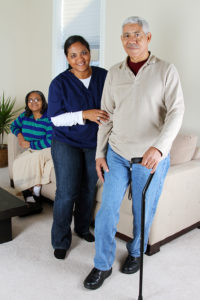Hip Fractures in Older Adults: Risk Factors, Symptoms, and Prevention
Home Care in Northbrook IL
Falling is the main reason older adults end up in the emergency room. One minor slip could cause the elder to fracture their hip. Since seniors have less bone mass and a weakened immune system compared to younger adults, they could be at risk for health complications as a result of a fractured hip. This type of injury may also require help from a home care provider while they are recovering.
compared to younger adults, they could be at risk for health complications as a result of a fractured hip. This type of injury may also require help from a home care provider while they are recovering.
Understanding the risk factors and symptoms, as well as how to prevent these life-threatening injuries will help prepare you for any future hip fractures your loved one may endure.
Risk Factors
Since bone density and muscle mass are often lost with age, the bones of elderly adults can break easily. However, there are some other factors that may also cause the elder to fracture their hip.
- About 70 percent of hip fractures occur in women
- Chronic health conditions that cause the bones to become weak
- Certain medications
- Lack of vitamin D and calcium
- Not doing enough weight-bearing exercises
- Excessive alcohol and tobacco use
Symptoms
If you notice any of the following symptoms in your elderly loved one, take them to the emergency room immediately.
- Unable to move immediately after falling
- Complaining of pain in their hip or groin area
- Unable to put weight on the leg that is on the side they fell on
- Turning outward of the leg on the side that was injured
- The leg on the side that was injured appears to be shorter
Prevention
While there is no way to completely prevent an aging adult from fracturing their hip, these tips will significantly reduce their risk of fall-related injuries.
- Increase their vitamin D and calcium intake. Without these two nutrients, your loved one’s bones will become brittle and break easier. Fortunately, vitamin D and calcium supplements are available. Discuss these supplements with the elder’s doctor before beginning to take them.
- Begin a weight-bearing exercise program. These types of exercises will help increase bone density, while also improving the senior’s balance and agility, reducing their chances of falling. Similar to the vitamin D and calcium supplements, discuss exercise with the doctor to make sure it is safe for the elder to do.
- Check the home. Most homes are a safety hazard for older adults. Walk through the senior’s home to see if they have any loose rugs, cords in the middle of the hallways, a sturdy railing on their stairs, and how safe the bathroom is. Make any changes needed to keep the elder safe while at home.
If you or an aging loved one are considering home care in Northbrook, IL, contact the caring staff at Companion Services of America today at (847) 943-3786. Our home care service area includes Northbrook, Highland Park, Deerfield, Glenview, Buffalo Grove, Evanston, Des Plaines, Skokie, Lake Forest, Wilmette and the surrounding areas.
Source:
https://www.mayoclinic.org/diseases-conditions/hip-fracture/basics/definition/con-20021033
- Getting Seniors to Talk About Feelings of Loneliness - April 17, 2024
- Helping Seniors Reduce Pain and Discomfort to Gain a Good Night’s Sleep - April 10, 2024
- Exploring Rehabilitation Services for Seniors Aging at Home - April 3, 2024
